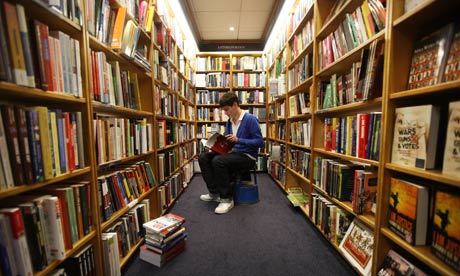
One aspect of the electronic reader that tempts me – and I'm an old fuddy duddy so I have to admit it might be the only one – is its space-saving ability. Is there a reader out there who doesn't occasionally feel crushed by possessing too many books?
We're in book acquiring season now. Winter's coming, so we stock up on autumn's prize-winners and runners-up. Christmas is around the corner, which means many of us will receive gift books or tokens. What will be the destiny of all these tomes? Unless you're a compulsive hoarder, you make a decision each time you finish reading a book that belongs to you. To keep or not to keep, that is the question.
But what's the answer? One could say, "Good books get kept, bad books go to Oxfam", but that would be oversimplifying. All of us, I suspect, have our systems. Me, I'm as likely to hang onto a thriller as a literary novel if I foresee a second reading in the future – but I move a lot, and space and transport costs make choices necessary. They're often hard ones, for example choosing to shed bigger books on account of the weight. But for any book lover, I believe the most satisfying route for a book enjoyed is its continued circulation. There's a pleasure in lending books to others – as long as they aren't dog-earing philistines who spill wine, wreck bindings through one-handed reading, or otherwise send books to early destruction. Alas, many of my friends are just such readers – so they don't get to read books I plan to reread.
Books I don't plan to reread I loan to friends then give up: as donations, as sales to used bookstores, as parting gifts to visitors seeking something to read on the flight home. I enthusiastically endorse the sales approach taken by Berlin's expat hangout Another Country, which combines secondhand bookshop with lending library. Approximately 20,000 books in English are colour-coded by price; you can keep your purchase after reading or return it for a full refund minus €1.50.
I love everything about books – the smell, the feel, the design, the covers – so parting is often sad. Because there is no foolproof method of culling it's also fraught with anxiety. I've saved books for several years, sure I'll read them again, then moved them along without a second thought, much less another reading. I've given books to friends only to buy them again. Some simply disappear: I'm on my fourth copy of Patrick Suskind's Perfume and my third of Beryl Bainbridge's The Bottle Factory Outing.
Like most people, I've clung to a few books for sentimental reasons: some boys' mysteries from 1920s (Poppy Ott and the Galloping Snail) because they were my father's childhood favourites; my original copy of The Joy of Cooking; the complete Lucia series by EF Benson, which I've had since the 1970s and reread many times. These books have journeyed to many homes in several countries and survived intact. I've also kept everything by, for example, Alan Bennett and Michael Frayn but am now reacquiring Kurt Vonnegut without having the slightest idea when in the past 30-odd years his works and I parted ways. Having just seen the covers of the latest Great Ideas Penguins, I'm reminded that some books must be kept just because they're too pretty to give up.
After all of us have made our decisions – to keep, donate, sell or give to a friend – a whopping 7m books in the UK alone end up in landfills each year. This figure would be vastly reduced if people took better care of them, but, even so, all books made of paper eventually disintegrate. That sense of a book's mortality makes it mean all the more to one who's loved it and will, I think, keep electronic readers from killing off books.
The destiny of books? I think it's that they exist to be read again and again, by you, me or someone else. We look at other people's bookshelves and feel we know them a little bit better. Our own remind us where we've been and where we might choose to return.

